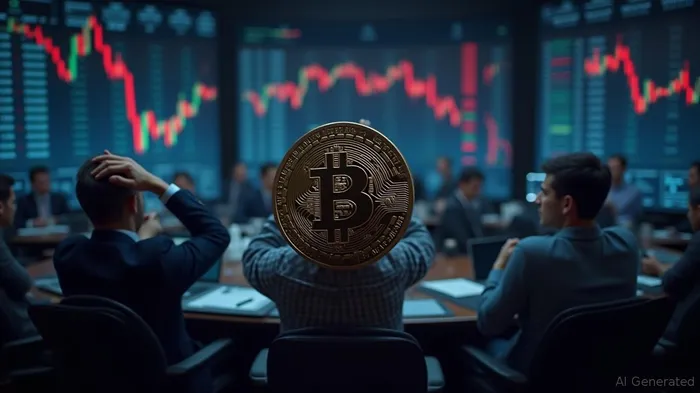Geopolitical Tensions Spark 10% Bitcoin Drop
Recent geopolitical events have significantly impacted the cryptocurrency market, causing dramatic shifts in prices and market sentiment. A U.S. military airstrike on three Iranian nuclear facilities led to liquidations exceeding $1 billion, ending Bitcoin’s 44-day streak above $100,000 and causing prices to drop to $97,000. Bitcoin is currently attempting to recover within a descending channelCHRO--, with critical support levels at $100,000 and $92,000, and resistance levels around $107,000 and $112,000. The fear of war, triggered by these actions, has left both crypto and traditional markets in a state of turbulence.
Arthur Hayes, the Co-Founder and former CEO of BitMEX, highlighted that central banks are preparing to print more money in response to the current market weakness. According to Hayes, this will strengthen Bitcoin’s status as a “safe haven” asset and prove its true value soon. Some analysts even consider the recent downturn as a buying opportunity. Historical data indicates that markets have recovered during war periods due to increased government spending and money printing. Although full-scale war seems unlikely, a reduction in tensions might spark a significant relief rally. Additionally, some analysts believe that Bitcoin could drop below $90,000 or even $80,000 without breaking its bullish market structure. Bitcoin, particularly in uncertain times, is often viewed similar to “physical gold”.
Data from Glassnode shows that since April, Bitcoin corrections have repeatedly bounced off the Short-Term Holder Realized Price, indicating the average cost basis for investors holding BTC for less than 155 days. However, the current Short-Term Holder Market Value/Realized Price (STH-MVRV) metric has dropped to only 0.03, reflecting that only 3% of recent buyers are moving with unrealized profits, increasing pressure on new investors.
Despite the ongoing conflicts, the Middle East region continues to embrace cryptocurrency. Sovereign wealth funds from numerous Middle Eastern countries are heavily investing in Blockchain technology for national infrastructure. Reports suggest that Russia is quietly building strategic reserves, amassing over $25 billion in cryptocurrency. Even Mexico’s third-richest individual plans to allocate up to 80% of his portfolio in BTC and mining companies, signifying a growing trend among billionaires. Several U.S. states have started forming strategic Bitcoin reserves. These developments are interpreted as a sign of long-term institutional confidence in Bitcoin.
Analysts emphasize that nothing fundamentally has changed regarding Bitcoin or cryptocurrencies, suggesting that the recent fear-induced downturn should be seen as a temporary cleanse. Global Blockchain adoption is rising, and with governments printing more money and increasing institutional demand, the long-term narrative for Bitcoin and other cryptocurrencies remains positive.
Geopolitical tensions have once again proven their ability to dramatically shake the cryptocurrency markets, with recent events highlighting the sensitivity of digital assets to global conflicts. The latest military actions, particularly the U.S. strikes on Iranian targets, have illustrated how swiftly and significantly cryptocurrencies can react to geopolitical developments. Initially, Bitcoin seemed resilient, but as the situation unfolded, the market corrected sharply. Ethereum and Solana experienced notable declines, with Ethereum dropping by up to 10% and Solana by over 7%. This volatility underscores the interconnectedness of cryptocurrencies with broader financial markets and global tensions.
The impact of geopolitical events on cryptocurrencies is not limited to sudden price swings. The recent U.S.-Iran conflict, for instance, triggered a broader market crash, with Bitcoin falling below $100,000 and other major cryptocurrencies following suit. This event led to a significant drop in the total market capitalization of cryptocurrencies, highlighting the vulnerability of digital assets to geopolitical risks. The closure of the Strait of Hormuz, a critical global oil supply route, further exacerbated market uncertainty, leading to substantial liquidations of long positions.
The role of institutional adoption in mitigating this volatility is complex. While increased institutional involvement brings liquidity and stability to the market, it also subjects cryptocurrencies to greater scrutiny and regulatory pressures. Institutions, with their significant holdings and influence, can inadvertently fuel market volatility through their actions and reactions to regulatory changes. This dual nature of institutional adoption means that while it offers potential benefits, it also introduces new challenges for the cryptocurrency ecosystem.
Comparing Bitcoin to traditional safe havens like gold reveals another layer of complexity. Unlike gold, which typically rises during times of geopolitical uncertainty, Bitcoin tends to move in tandem with risk assets. During the U.S.-Iran conflict, Bitcoin experienced significant declines, indicating a stronger correlation with equities than with traditional safe havens. This behavior raises questions about Bitcoin's role as a safe haven asset and its potential to provide stability during global crises.
The recent geopolitical unrest has also triggered a wave of uncertainty in the broader financial markets, including cryptocurrencies. The escalating tensions between Israel and Iran have been a primary driver of this volatility, with investors reacting to the heightened risks. The market's response to these events underscores the need for a deeper understanding of how global conflicts influence cryptocurrency prices and market dynamics.
In conclusion, geopolitical tensions significantly impact cryptocurrency volatility, with recent events serving as a stark reminder of this relationship. While institutional adoption may offer some stability, it also introduces new challenges. As the financial industry continues to evolve, it is crucial to navigate these complexities and develop a more nuanced understanding of how global conflicts influence the cryptocurrency market.

Quickly understand the history and background of various well-known coins
Latest Articles
Stay ahead of the market.
Get curated U.S. market news, insights and key dates delivered to your inbox.



Comments
No comments yet